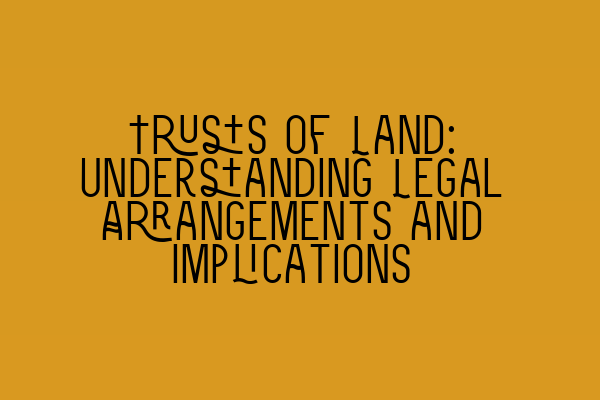Trusts of Land: Understanding Legal Arrangements and Implications
Welcome to SQE Property Law & Land Law! As trusted solicitors specializing in property law, we are here to guide you through the intricate world of trusts of land. In this blog post, we will demystify the legal arrangements and implications surrounding trusts of land, and help you navigate this complex area with ease.
What is a Trust of Land?
A trust of land is a legal arrangement where property is held by one person (the trustee) on behalf of others (the beneficiaries). This arrangement ensures that the property is managed and used in accordance with the wishes of the beneficiaries as outlined in the trust deed.
Types of Trusts of Land
1. Bare Trusts:
– A bare trust is the simplest form of trust of land.
– In a bare trust, the legal title of the property is held by the trustee, but they have no discretion in the management or control of the property.
– The beneficiaries have the right to possess and enjoy the property, and the trustee must act in their best interests.
2. Fixed Trusts:
– A fixed trust is a trust of land where the interests of the beneficiaries are clearly defined and cannot be changed by the trustee.
– The beneficiaries may have different proportions of ownership, but these proportions remain fixed throughout the life of the trust.
– The trustee’s role is to manage and distribute the property in accordance with the terms of the trust.
3. Discretionary Trusts:
– In a discretionary trust, the trustee has discretion over how the property is managed and distributed among the beneficiaries.
– The trustee holds the legal title and has the power to make decisions based on the best interests of the beneficiaries.
– This type of trust provides flexibility, as the trustee can adapt to changing circumstances and needs of the beneficiaries.
Implications and Considerations
1. Trustee Duties:
– Trustees have a fiduciary duty to act in the best interests of the beneficiaries.
– They must manage the property prudently, make informed decisions, and avoid any conflicts of interest.
– Trustees are also responsible for maintaining accurate records and providing regular reports to the beneficiaries.
2. Beneficiary Rights:
– Beneficiaries have the right to possess and enjoy the property, receive income generated from the property, and have a say in decisions affecting the property.
– They can also apply to the court to modify or terminate the trust if the trustee is not fulfilling their duties or if circumstances have changed.
3. Tax Considerations:
– Depending on the nature and purpose of the trust, there may be tax implications to consider.
– It is essential to seek professional advice to ensure compliance with tax regulations and optimize tax efficiency.
4. Dispute Resolution:
– Disputes may arise between trustees and beneficiaries or among beneficiaries themselves.
– It is prudent to include dispute resolution mechanisms in the trust deed to avoid costly and time-consuming litigation.
Understanding trusts of land and their legal implications can be challenging. At SQE Property Law & Land Law, our team of expert solicitors is here to help you navigate the complexities and provide tailored solutions that align with your needs.
Contact Us
If you have any questions or require legal assistance with trusts of land, please do not hesitate to contact us at SQE Property Law & Land Law. Our experienced solicitors are ready to assist you every step of the way.
Remember, knowledge is power, and understanding trusts of land can greatly empower you in managing your property and protecting the interests of your beneficiaries.
Disclaimer: This blog post is for informational purposes only and does not constitute legal advice. Please consult with a qualified solicitor for personalized advice tailored to your specific situation.
[Contact Us Button]
